
Sweetness and Lightning is a slice of life series that aired in 2016. At its core there’s a story about family, grief, and finding a place to belong.
These themes are wrapped up nicely in a show that centers around the heart of every home, the kitchen. On the surface, this is a cooking series. Beneath that, each dish that the characters make provide catharsis for their struggles.
The anime isn’t dark by any stretch of the imagination. In spite of the themes surrounding it, the series is very upbeat. The writing is masterful, but it’s not deep. Each emotional issue is handled maturely, but, the series itself can easily appeal to almost all ages. At the end of the day, the story is about familial love, and finding comfort in places that the characters would least expect them.

The anime is an adaptation of a manga with the same name. The adaptation is true to its source material, diverting only slightly when the narrative demands it. Those occasions are rare, minor, and actually make the anime a better viewing experience. The subtle changes aren’t always easy to notice, and that’s the way it should be.
The twelve episode series follows two very different family dynamics. It focuses on both equally, but, one family stands out more.
The Inuzuka Family
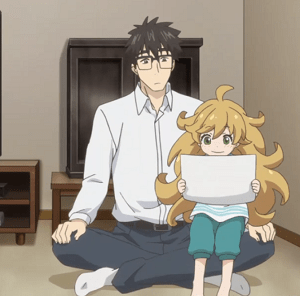
The first family is a father and daughter. Kōhei Inuzuka is left a widower after his wife’s passing. His daughter, Tsumugi Inuzuka is still quite young. She’s only in kindergarten, and therefore she’s solely dependent on her dad for almost every need. Kōhei struggles with the demands of being a single parent.
Working a full time job as a teacher and seeing after his youngster are large emotional commitments. He is not a homemaker, and he has no idea how to fill the void his wife left behind.
The Iida Family
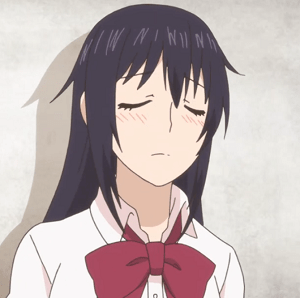
The second family follows the Iida family. Kotori is a student in his class. She spends a lot of her time alone, both at home and at school. She’s a loner by choice and routine. Her mother is often away, having a very small role in the anime. The absence of Kotori’s mother is a driving force for her loneliness in the series.
Kotori has a passion for food. Since her mother is an acclaimed celebrity chef, she knows her way around the kitchen. However, her incredible fear of knives keeps her from enjoying that passion to the fullest.
Mundane Life
This is not an action filled series. It is not full of suspense or plot twists. There are not a lot of over the top “anime style” gags, and you won’t find many standard tropes clogging up the anime either.
Even among the slice-of-life anime often provided to fans, this show is something that might appeal to a “non-anime” fan due to its down to earth nature.

The series asks its viewers to sit down and enjoy a relaxing story. Sweetness and Lightning is episodic, and mundanity is literally everywhere.
This is a series that finds its excitement by characters interacting within the confines of every day life. Each struggle begins and ends with one key component; the family dynamic.

The story opens with the the facts of life at the Inuzuka home in plain view. Six months before the series begins, the love of Kōhei’s life passed away. He’s still grieving, and trying to make ends meet. As a single father, this is no small task.
Kōhei has no idea how to cook, and so he lives off of ready made meals, serving his daughter the same. These foods aren’t healthy. Often times, they aren’t even tasty. His wife had been the one to make the family meals, but with her passing it now falls onto him.
Kōhei fails to keep a largely stocked kitchen, and can’t prepared the dishes his daughter loves to eat most. Worst of all for him, his daughter often comments on this.
While still grieving himself, he feels incredibly guilty that he can’t live up the memory of her mother.
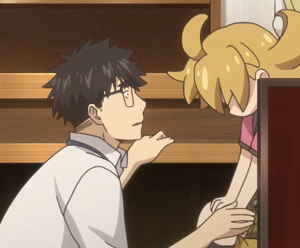
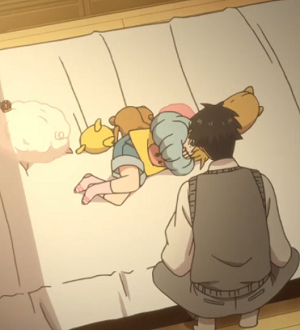
Tsumugi obviously misses her mom, but the concept of death is a foreign concept to the little girl. She can’t quite grasp it, and the way she mourns reflects this. Everything is in the little details for her. She complains that meals have become different now. She gets upset with the changes in her routine.
The things her mom used to do are now in her father’s hands, and Tsumugi has to cope with those changes. It’s all very age appropriate, and fits the narrative well. It never comes off as “too much”, and it isn’t overbearing either. There are plenty of scenes that follow her day-to-day life too, and the conflicts that she runs into. Both at school and at home.
To that point, I want to reiterate that Sweetness and Lightning is a very down to earth series. Tsumugi is a little girl, and she acts like one. She can be very bright and cheerful. However, like all small children Tsumugi throws her fair share of tantrums too.
She’ll pick at her food, or reject it entirely. She’ll babble nonsense, or fight back a little when she’s scolded by her dad.

She is a very accurate depiction of a child. If you don’t like children, this aspect could easily get on your nerves. Tsumugi is such a major character in the anime that you can’t avoid her. She has way too much screen time to be ignored.
Unlike other family style anime that may have a child in it, this series focuses on those complexities. Kōhei’s personal story is about the difficulties of being a parent. Tsumugi is her own unique character, and she does challenge her father.

Meanwhile, Kotori is an average teenage girl. Her passion for cooking aside, she can be a bit of a wallflower. She does have one close friend her own age named Shinobu. The character makes occasional appearances every now and then.
Other than that, Kotori mostly spends time on her own. As an only child of divorced parents, she’s used to being independent.
The only interesting character quirk she has is a terrible fear of knives. She managed to cut herself pretty badly as a child, and the fear of knives persists because of it. Other than that, Kotori isn’t very interesting on her own.
What truly uplifts Kotori as a character is the way she interacts with Tsumugi and Kōhei.

The student and teacher dynamic between them slowly shifts into one of friendship. At the high school, Kōhei maintains his position of authority. After school hours, he begins to treat Kotori as an equal.
The way that Kotori proves herself capable of assisting with Tsumugi helps to lessen the divide between them. As the series goes on, the way these two families merge help to fill the respective voids between them.
The Kitchen: The Heart of Every Home

Obviously, if you don’t like anime centered around cooking, you won’t like this. A vast majority of the scenes take place in the kitchen. It focuses on how meals are prepared, and the steps it takes to make a home cooked meal. Learning these basic steps remain the foundation of the series as a whole.
Kotori’s mother owns a restaurant, although it usually remains closed. Through a series of events, Tsumugi acts as the balm to eventually tie this odd trio together. The three of them end up gathering regularly at the restaurant, learning to make home cooked meals. They eat together and treat each other as a family.

As the characters spend more time together, old pains begin to lessen significantly. The two broken families start to redefine what it means to be a family in the first place.
The teacher becomes the student, perhaps the only actual plot twist in the show. Still, it’s no surprise to the viewer. Kōhei learns his way around a kitchen with Kotori’s help. She knows more than he does, and it’s good that the dynamic shifts here. It shows that the characters mutually respect each other.
With all of her mother’s recipes at her disposal, they work together to make each dish. Kotori finds comfort in spending time with Kōhei as well. She also gets along well with Tsumugi, eventually treating her like a younger sibling.
There is a saying that families are made around the dinner table, and this anime examines that. As time goes on, more friends join in on the nightly gatherings, forming strong bonds.
Although nothing inappropriate ever goes on between Kōhei and Kotori, the connection they build runs deep. You could choose to see something beyond a platonic friendship if you wanted. However, the anime only provides minor subtext for that. You’d honestly have to be looking for romance in places that it just isn’t.
Like Anime and Gaming content? Check out our other platforms below:
Kotori’s emotional state shifts as the series progresses. Shinobu, her best friend even takes notice. She states that Kotori seems to be at her happiest whenever she’s cooking food and eating with the Inuzuka family.
Kotori’s mother eventually meets Kōhei and Tsumugi. She finds herself grateful that her daughter found such good people to have in her life and encourages their time together to continue.
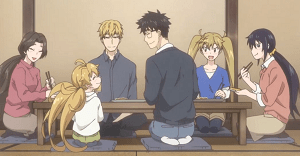
The changes over time for Kōhei and Tsumugi are also noteworthy. Kōhei becomes more capable as a father. When he finds himself lacking, Kotori helps to influence the way he deals with his daughter’s outbursts. Tsumugi becomes happier in general, and truly enjoys her time spent with Kotori.
Final Thoughts
If you don’t like anime with kids actually acting according to their age, skip it. Tsumugi is unavoidable as a character. She is a child, and she unequivocally acts like it.
On the other side of the coin, if you’re looking for a romantic series with a significant age gap between the characters, this is not it. You’re going to have to look hard for that subtext and frankly there are just better anime out there for that sort of romantic entanglement.

Sweetness and Lightning is about family, the cultivation of strong familial bonds, coping with loss, and overcoming grief. These are the themes that make the cooking aspect of the anime so powerful. They are the absolute core of everything, without fail.
Trying to take any of that out of context, for any reason, probably won’t serve you well.
The animation in the series is good, and holds up adequately enough. Like all anime that revolve around food, the animation sees a spike in quality when meals are displayed.

Some of them look good enough to eat, and appear more appealing than their real world counterparts.
The musical design is spot on, and enjoyable. Like the series itself, it doesn’t try to be over the top. It won’t stand out over the scenes, and I don’t find it memorable outside of that. The music only serves to be complimentary towards the series. The opening and ending songs are enjoyable for what they offer, but, they won’t make any of my top ten lists any time soon.
The anime leaves these two families as fast friends. There is subtext that the two might become one later down the line. However, that isn’t written in stone. The subject of romance itself is not something that is heavily addressed, and that’s fine. It shouldn’t be.
The anime never pulls a “Usagi Drop” moment either, and Kōhei’s friendship with Kotori is respectful at all times. It never crosses into questionable territory or inappropriate power dynamics.
Sweetness and Lightning is everything the title says. It is a very sweet series. The darkness that comes with it doesn’t overtake the series as a whole. Instead, the sadness is brief, but carefully included. The anime strives to tell a simple story, with a simple conclusion.
In the end, it provides strictly what it promises, and very little more.
It doesn’t necessarily fall into the “cute girls doing cute things” trope, and I wouldn’t call it a “healing” anime either. I didn’t feel refreshed or renewed after watching it.
The fact is that slice-of-life is its nearest comparison, but that’s a lackluster description of the series too. None of these categories do the show the justice it deserves.
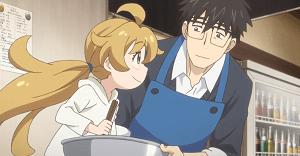
Although I enjoyed it, and I would watch it again, for me it’s just a popcorn anime. The series is addictive in the moment, and its very easy to consume. The episodic nature makes it a joy to binge watch. This, coupled with the fact that it’s only twelve episodes long makes it an ideal choice during a lazy Saturday afternoon.
It’s a tame viewing experience. Those qualities make Sweetness and Lightning a top contender for family style anime of this nature.
If you’d like to see a few other reviews on the topic I’d say Them Anime and Lumi has you covered for more opinions on this wonderful series.
In the end, I would say that Sweetness and Lightning is merely a story about life. It doesn’t go anywhere particular, and it doesn’t need to. There are very few anime that can put so much heart and soul into such a mundane story. That alone makes it worth a watch if you like shows that center around family dynamics.
This has been Kernook of The Demented Ferrets, where stupidity is at its finest and level grinds are par for the course. I’ll see you next time.
Meanwhile, check out some of our other great content below. You can also find more information about supporting us at the bottom of this post.
With your contributions, you make our efforts possible. Thank you for supporting our content. Patreon supporters receive access into our official Discord server, and a few other perks depending on the tier. If you don’t care for Patreon, and don’t care about perks, you can always support us through PayPal too… links below.
Those who join via Patreon get special perks, such as extra content, quicker updates, early fiction chapters and more.
Patreon Supporters:
($3) Little Ferrets: None
($5) Demented Minions: Francis Murphy and Andrew Wheal.
($7) Fandom Ferret: None
($14) True Blue Ferret: None.
($25) Premium Ferret: None.
($50) Round Table Ferret/Fluffy Ferret: Josh Sayer



[…] The single father is a widower. He is incredibly relatable to anyone who has needed to raise a child on their own. It won’t just be men that relate to him, either. Women can easily imprint upon his struggles, because they aren’t inherently based around fatherhood itself, but parenthood and the loss of a spouse in general. It isn’t a heavy series, but the themes have enough substance to resonate with older viewers. I have a review for this series as well, it can be found here. […]
LikeLike
[…] In this way, you might say A Little Snow Fairy Sugar is very similar to Sweetness and Lightning. […]
LikeLike
[…] – [Movie]Silent Hill – [Game]Space Brothers – [Anime]Subway Surfers – [Game]Sweetness and Lightning – [Anime]The Promised Neverland – [Anime]The Shawshank Redemption – [Movie]The Static Speaks My […]
LikeLike
[…] – [Movie]Silent Hill – [Game]Space Brothers – [Anime]Subway Surfers – [Game]Sweetness and Lightning – [Anime]The Godfather – [Movie]The Promised Neverland – [Anime]The Shawshank Redemption – […]
LikeLike
[…] make note of, though. Momo is quite young, and she acts her age. If that prospect annoyed you in Sweetness and Lightning, or particularly young characters aggravate you in general, it’ll likely annoy you here as […]
LikeLike
[…] December 20, 2023No Comments Article Source […]
LikeLike